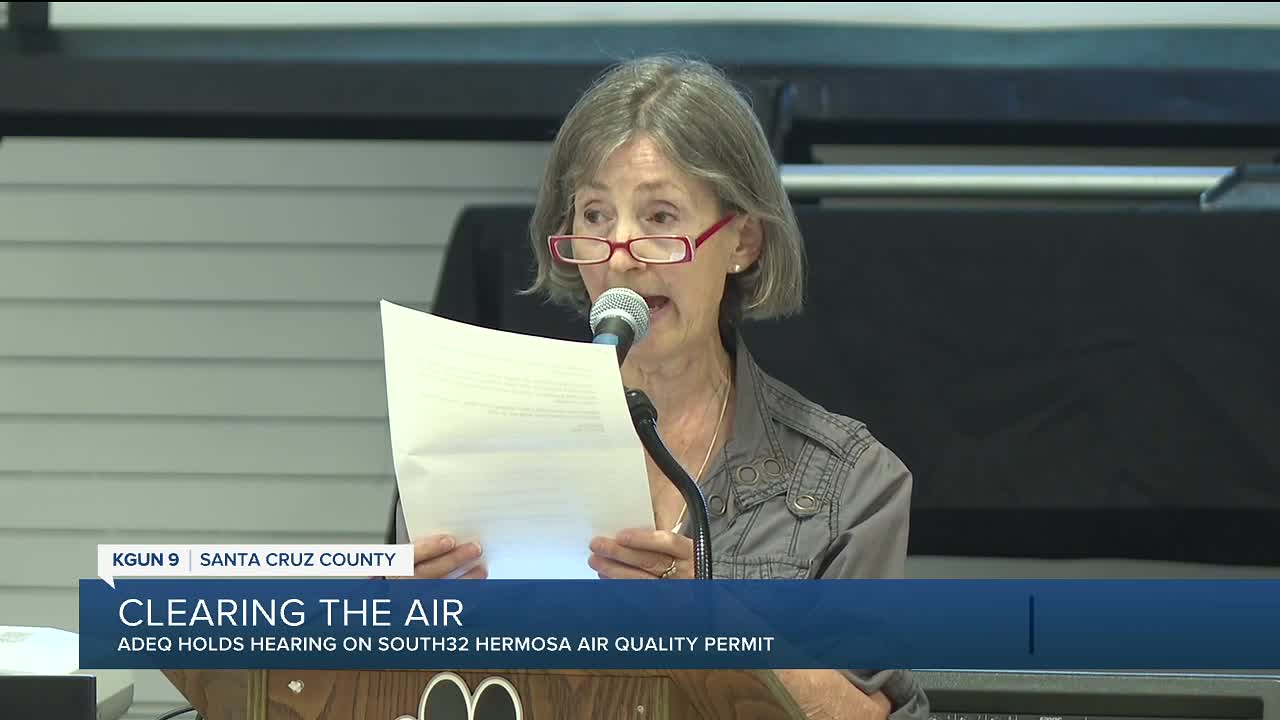SANTA CRUZ COUNTY, Ariz. (KGUN) — The Arizona Department of Environmental Quality (ADEQ) faced a packed room at Patagonia High School as community members raised concerns over South32’s proposed Hermosa mine.
The meeting followed ADEQ receiving an order from the Environmental Protection Agency (EPA) to require a revised permit within 90 days and solicit public comment, citing violations of the Clean Air Act.
ADEQ presented a revised permit, meant to address five key issues flagged by the EPA. But for many residents, the changes still fall short.
Dr. Susan Lange, who moved to Patagonia three years ago, said she worries about the potential health risks.
“A lot of elderly and retired here, they’re going to be super sensitive if there is particulate matter and heavy metal exposure in the air,” Lange said.
Much of the opposition has been led by the Patagonia Area Resource Alliance (PARA) and the Center for Biological Diversity, the groups that originally appealed the permit.
PARA’s executive director, Anna Darien, said the revised draft still lacks safeguards.
“It fails to set enforceable limits for a hundred different particulate matters, so we’re talking about dust that can get into the lungs of children, people with asthma, older adults and make them really vulnerable,” Darien said.
She said PARA was advocating for the rejection of the revised air quality permit.
“We want them to bring us a permit that has enforceable limits and an actual way to show how their data will protect us,” Darian said. “We basically have a mine that could operate and pollute the air in this community, and we have no way to show that they are out of compliance because the metrics for establishing compliance are insufficient.”
Others, like Rio Rico resident Jay Thompson, pushed for stronger real-time monitoring rather than relying on emissions estimates.
“We think with all the technology that’s available today, that we can actually do a better job of getting numbers from sensors versus doing basically more calculated results,” Thompson said. “I’d like to see newer and more recent sensors and other approaches to document the numbers in real time. If you’re going to have a high-tech mine, then we have to have high-tech monitoring equipment on it.”
South32 Hermosa President Pat Risner said the company welcomes the dialogue.
“These are important issues, both for the community and for us, to make sure we get this right, so that as we develop the Hermosa project, it’s protective of human health and the environment,” Risner said.
Risner said South32 has instituted voluntary measures to go above and beyond what compliance requires.
“We weren’t required to model manganese emissions under the Clean Air Act,” Risner said. “But we modeled manganese emissions and compared it to a health-based standard to demonstrate that we can meet that limit at the mine site. This was something we did voluntarily in collaboration with ADEQ because we heard up to that point that it was an issue for the community.”
He added that the company is capturing baseline monitoring along transportation routes, which he says is outside of the regulatory process.
While the permitting process continues, South32 has moved ahead with construction at the Hermosa site, which aims to mine zinc and manganese, metals used in steelmaking and in batteries for electric vehicles.
Public comments on the revised permit closed September 25. ADEQ will now compile feedback and submit a summary to the EPA, which will make the final decision on whether to approve or reject the permit.
The Hermosa Mine is expected to begin operations in 2026.
The revised and original Hermosa Mine air quality permits can be found on the ADEQ website.
——
Joel Foster is a multimedia journalist at KGUN 9 who previously worked as an English teacher in both Boston and the Tucson area. Joel has experience working with web, print and video in the tech, finance, nonprofit and the public sectors. In his off-time, you might catch Joel taking part in Tucson's local comedy scene. Share your story ideas with Joel at joel.foster@kgun9.com, or by connecting on Facebook, Instagram or X.






